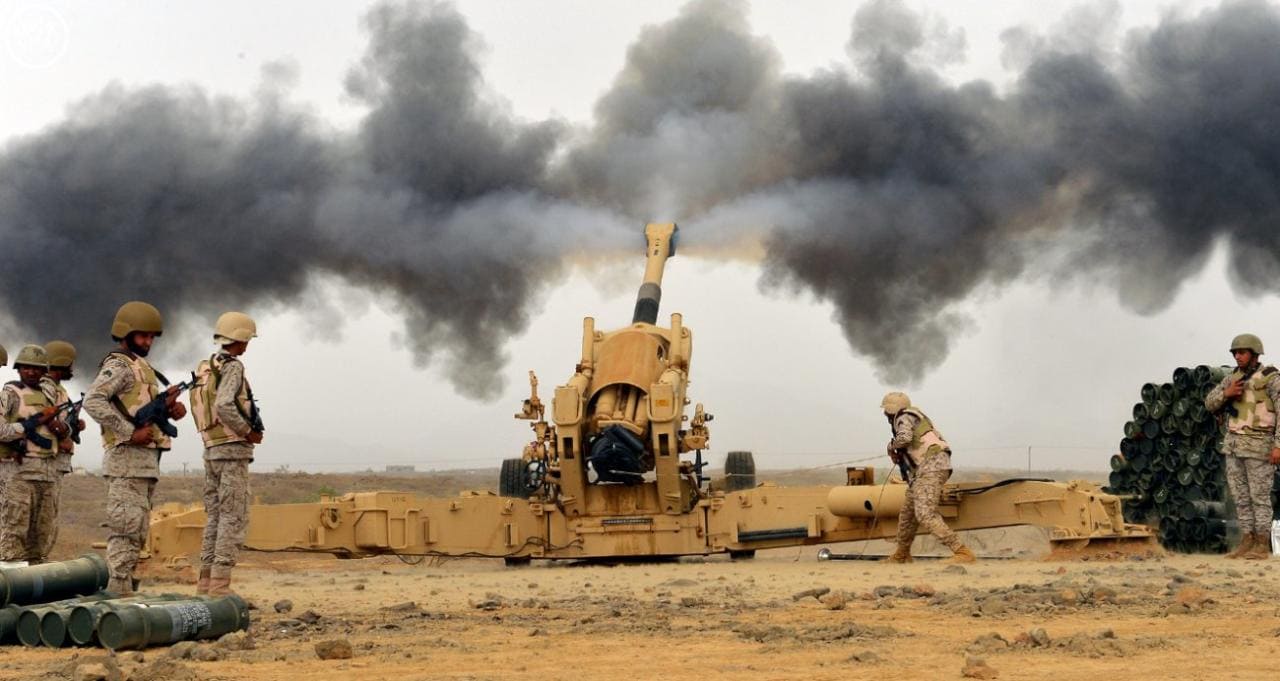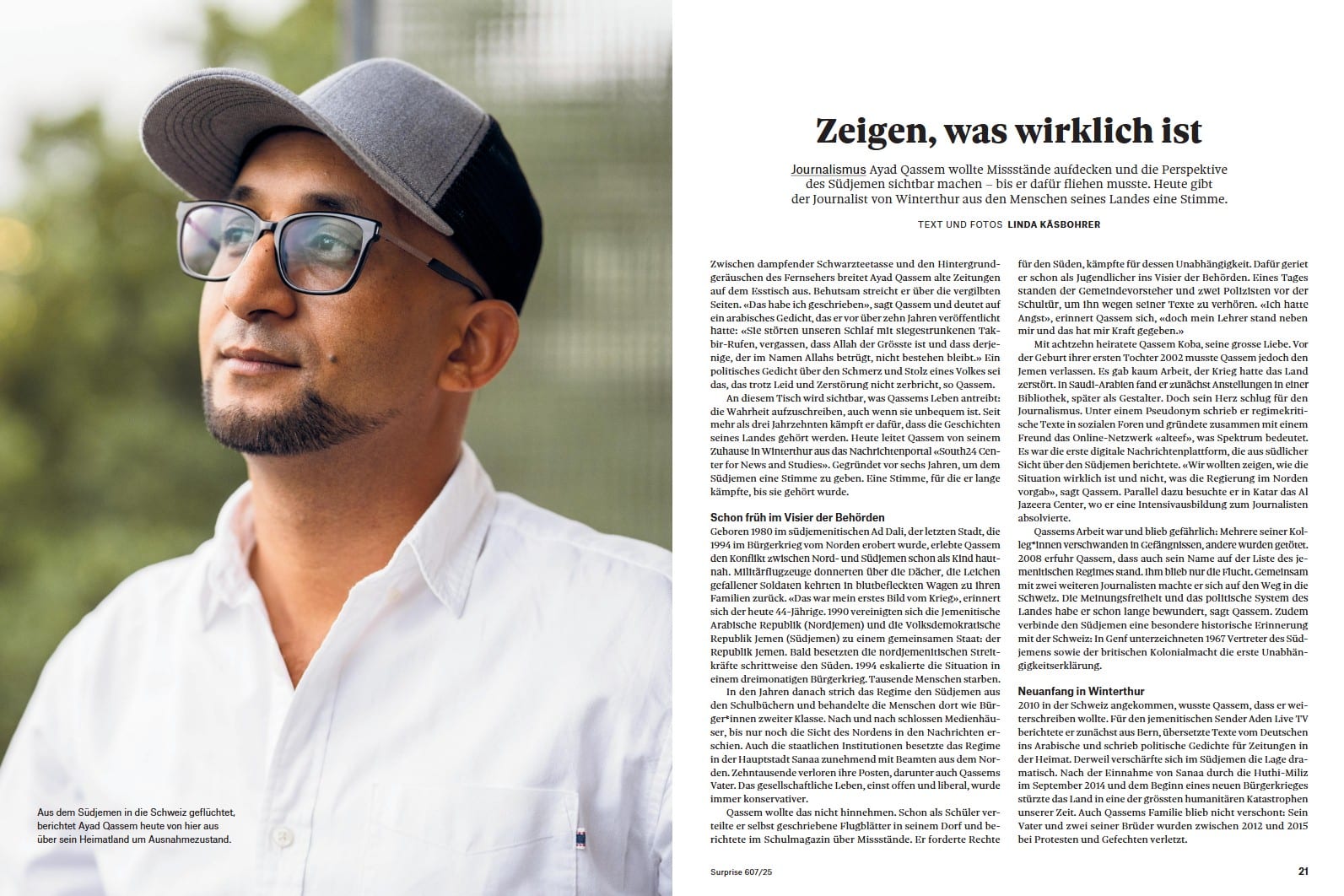
Saudi forces on the border with Yemen (Al-Arabiya)
آخر تحديث في: 17-10-2022 الساعة 9 مساءً بتوقيت عدن
Abdullah Al-Shadli (South24)
On October 13, the UN Special Envoy to Yemen Hans Grundberg briefed the UN Security Council, 11 days after the end of the UN truce, without renewal or extension.
In the briefing, the envoy expressed his regret that no agreement on extending or expanding the truce was reached, and said that this had created "a state of uncertainty and increased the risks of renewed war in the country."
“I regret that Ansar Allah [the Houthis] came with additional demands that could not be met,” Grundberg said. “I appreciate the position of the Yemeni government to deal with my proposal positively. As I continue to work with both sides to find solutions, I urge them to show the leadership and flexibility needed to reach an extended and expanded agreement."
The bulk of the briefing included a detailed explanation of the terms of the expanded truce proposal submitted by Grundberg to the conflict parties, and they agreed in principle, according to informed sources, before the Houthis presented "impossible" demands, as described by a previous statement of the UN Security Council.
Despite the serious clashes that took place on some military fronts, Grundberg said, “Fortunately, we did not witness any major military escalation, and only intermittent exchanges of artillery and small arms fire were reported on the fronts in Taiz, Marib, Hodeidah and Al-Dhalea.”
The envoy pointed out that some of the terms and agreements of the previous truce, which lasted for 6 months, are still in force today despite the end of the truce, such as flights from Sanaa International Airport, and the "regular" entry of fuel ships to the port of Hodeidah, all of which are in favor of the Houthis.
"During the 11 days following the end of the truce, I continued my tireless efforts to communicate with the parties as well as regional and international partners about options for renewing it," the Swedish diplomat noted.
He added, "I just returned from my visits to Abu Dhabi and Muscat, where I had important discussions on ways to move forward in close coordination with Yemen's neighboring countries. I personally still believe that there is still a chance for the parties to reach an agreement."
Although the envoy implicitly acknowledged the Houthis' responsibility for the failure to reach a truce agreement due to their demands, he did not explicitly condemn them. He also did not specify whether his current efforts focus on persuading the group to abandon these demands, or persuading the other party to accept them.
Although the Houthis' demands have been widely criticized, including by the UN Security Council, the US Envoy to Yemen, and Grundberg, the group's stubborn adherence to them appears to have brought negotiations to extend the truce largely deadlocked.
In separate statements by senior Houthi officials, they announced their intention to take the war to a new level by targeting international interests and oil and shipping companies inside and outside Yemen, if these "impossible" demands were not met.
The Houthis’ demands include paying the salaries of civil servants and military employees alike from oil revenues in areas under the Presidential Council's control, which the latter rejects, especially since the envoy’s proposal included paying salaries for the civil sector only with full involvement of the revenues of the Houthi-controlled port of Hodeidah, according to the proposal statement in which a copy was seen by South24 investigation team.
Related: The Pretext of «Salaries»: South is the Victim of the UN Truce
Although Grundberg's efforts, backed by endless international pressure, are still ongoing, the war scenario is the most present possibility in everyone's minds today. This is reinforced by the occasional sounds of artillery shelling at the military fronts, and the days passing without any clear progress in the negotiations.
Return of war
Analysts and politicians who spoke to "South24" believe that the current data after the faltering agreement on the truce indicates the return of the war, which declined during the past six months, with the entry of gas and oil into the scope of the conflict.
Regarding this, military expert Colonel Wadah Al-Obali told "South24 Center": "If the Houthis continue their intransigence, all scenarios will be expected. The group will attack Marib, Shabwa and the West Coast, as well as Saudi Arabia and the UAE with cross-border attacks."
The expert believes that "Marib is at the top of the military and economic priorities of the Houthis". He added, "This is not new. The Houthis have focused all their military effort on Marib throughout 2021."
"I think that the Houthis will explode its war this time with a major and sudden attack on Marib fronts, without the other side's preparation and without good defensive preparation to repel this type of attack," he added.
Al-Obali did not rule out the fall of the city of Marib to the Houthis' hands, who said that they "recovered their breath, and arranged their capabilities throughout the truce, for such an attack, after they had reached their lowest offensive levels on the fronts in the last months of 2021."
He added: "The Southern Giants Brigades had the leading role in aborting their most important offensive military axis across the southern front of Marib, an axis whose effectiveness ended with the arrival of the Giants' Brigades to Beihan and Harib on January 2022."
Disregarding Stockholm Agreement
On October 2, after the end of the truce, coinciding with the Houthis’ war threats, the director of the media center for the Southern Giants Brigades said: “Now it is possible to the forces to protect civilians, deter Houthis, and recover their money and salaries, the most important of which are those allocated from the port of Hodeidah, which must be liberated.”
In late 2018, the Southern Giants Brigades approached the city of Hodeidah and its port after fierce battles against the Houthis, on the fronts of the West Coast of the country, before the "Stockholm Agreement" on Hodeidah was concluded between the Yemeni government and the rebel group in December of the same year.
Today, after the end of the truce, and the resurgence of the specter of war, it is expected that the "Stockholm Agreement", which halted the Houthi defeats, may be disregarded by the Presidential Council if the Houthis resume their attack on gas-rich Marib or target oil companies and facilities in Shabwa and Hadramout, South Yemen.
On the possibility of this, Al-Obali said: "Recent international positions and statements held the Houthis responsible for obstructing the renewal and extension of the truce. This may provide the appropriate conditions for the Presidential Council to obtain justifications for suspending work or withdrawing from the Stockholm Agreement, and moving to liberate Hodeidah."
He added: "What increases the chances of this scenario is the Houthis' recent threats to target shipping lanes. The threats came after their escalation in Hodeidah, with a large military parade that included naval mines, not to mention that the parade was held in areas covered by the Stockholm Agreement, and was opposed by the United Nations Mission in Hodeidah (UNMHA)".
However, the Sanaa-based political and economic analyst Rashid Al-Haddad told "South24 Center" that "the international community will not allow the collapse of the Stockholm Agreement." Al-Haddad added, "They are building on the agreement with hopes of reaching a comprehensive agreement that requires a ceasefire."
Oil conflict
With the increasing global energy crisis resulting from the Russian-Ukrainian war and the search by Western countries for potentially additional energy sources, including re-exporting gas from the Balhaf facility in Shabwa, South Yemen, the Houthis opened a new military path by threatening to target oil facilities and companies.
For Rashid Al-Haddad, oil and gas entering the conflict line is a "dangerous matter".
Al-Haddad said "the struggle for wealth is more dangerous than the struggle for power. This may push towards creating new alliances between Islah and the Houthis to preserve the gains of the Muslim Brotherhood in Marib, especially since there is a close link between the party's interests and its internal cohesion."
"In light of the great pressures facing the Muslim Brotherhood in Shabwa and Hadramout, there is a great possibility that the coming period will witness surprising alliances," he added.
Al-Haddad believes that "it is necessary to completely neutralize the oil and gas sector, as well as the economic aspect of the conflict, in order to spare the national economy further setbacks, especially as the warnings suggest that the oil and gas sector will turn into an open battlefield between the various parties."
Related: Oil and gas enter the conflict line in Yemen [Arabic report]
Al-Obali believes that the expansion of the war by the Houthis will not stop at the oil wealth, but will include important international waterways.
He added, "The straits and waterways are at the top of the Houthis' priorities in terms of blackmailing the international community. The Houthis believe that they will respond to these blackmails only by threatening the interests of the world."
And he added, "they are preparing for such operations, but their danger will diminish if the battle to liberate Hodeidah is accomplished, because it will isolate the group from the Red Sea, and thus neutralize its danger from the waterways."
Reaching an agreement
The head of the "Fikr [Think] Organization for Dialogue and Freedoms" Abdulaziz Al-Oqab believes that the truce renewal is a more likely possibility than the return of war.
Al-Oqab told "South24 Center": "Even if there are confrontations, the situation will be quickly contained. The situation in Yemen and the region requires calm, not war. We believe that the solution will only be at the dialogue table, no matter how long the war lasts, with evidence that no solution has been made during the past eight years".
He added, "The truce will be renewed, because the surrounding circumstances at the regional and international levels impose calm in Yemen and impose the truce continuation."
On the chances of reaching an agreement for the truce, Al-Haddad said: "International and regional efforts to save the truce are still ongoing even after the end of the truce. It seems that there is great international and regional interest to maintain the ceasefire on all fronts."
He added, "No matter how the violence escalates, it will not be more than mere skirmishes at the present time. The possibilities are that an agreement will be reached regarding the expansion of the truce during the coming period. I do not think that the confrontations will escalate in Marib or the West Coast."
So far, it seems that it is still too early to say for sure what will happen in the coming days and what international efforts and global pressures will lead to on the parties to promote an expanded truce agreement on the ruins of the previous truce. However, it can be argued that the Houthis' continued adherence to the same "impossible" demands may kill any real hope of reaching an agreement.
Moreover, any pressure on the Presidential Council to accept the new Houthi demands may cause a division and fragmentation with the Council, especially with the solid position of the Southern bodies within the framework of the Council, which oppose any concessions to the Houthis without return, and without guarantees that the group will abide by the terms that it undertakes.
It should be noted that, for the first time in years, Saudi Arabia and the Houthis exchanged, on Wednesday, two delegations to inspect prisoners from both sides. On Saturday, the group's prisoner affairs official said that the visit to Saudi Arabia was "successful", and the "final list" for the prisoners exchange of the two parties was signed.
Given that they are considered out-of-context visits and in unexpected circumstances, the move reflects less Saudi desire to renew the war, whose final weeks before the truce saw unprecedented attacks by the Houthis targeting oil and civilian sites in the kingdom.

قبل 3 أشهر

قبل 3 أشهر